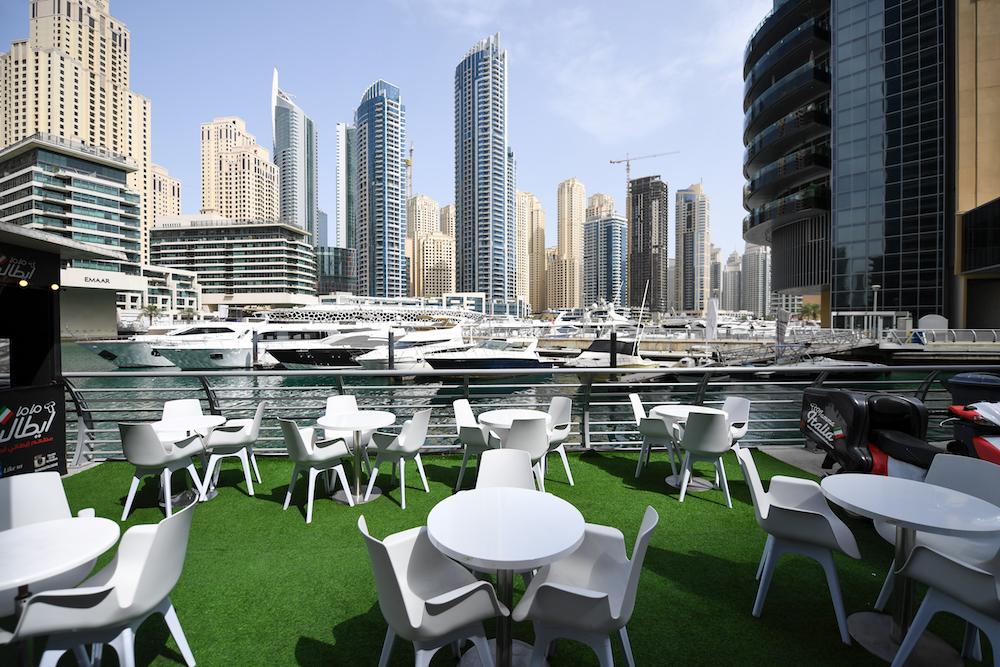https://arab.news/gp7ba
- Companies using social distancing to promote their business models have disrupted the traditional industry
- Delivery remains a business challenge for F&B operators that technology companies can help solve
DUBAI: A study of the impact COVID-19 has had on the food and beverage (F&B) sector revealed that in the weeks leading up to the complete shutdown of restaurants in March 2020, businesses experienced an overall 60 percent decrease in dine-in customers. Following the closures, revenues went down to zero for many restaurants in Bahrain, UAE and Saudi Arabia, which remains the case in some places.
While some restaurants already had arrangements in place for a delivery option, others used to rely exclusively on dining experiences. Fine-dining operators such as Coya and Zuma had to quickly adopt a different model by partnering with direct-to-consumer delivery platforms such as Chatfood, which saw a surge in new clients from the region.
Even for fast-food chains and smaller, less affluent restaurants, delivery remains a business challenge that technology companies can help solve, particularly during times of economic turmoil.

No shisha pipe sessions, deserted streets, mosques and shopping malls, drones in the sky broadcasting public health warnings — the coronavirus turned life upside down in Gulf societies. (AFP/File Photo)
Egyptian startup Halan runs a mobile ride-sharing platform that connects clients to on-demand motorcycles and tuk-tuks (rickshaws). The company, which is primarily focused on underserved neighborhoods, has delivery partnerships with many small restaurants as well as fast-food chains in Egypt, including McDonald’s and KFC, to help them deliver to areas that may be out of their reach.
Additionally, delivery aggregators such as Uber Eats and Delivery Hero have long offered exposure and convenience for restaurants in the region, allowing them to reach a larger customer base without the need to invest in expensive infrastructure. However, as the pandemic squeezed F&B businesses financially, the commissions charged by these aggregators, which can be as high as 30 percent of the order value, became an additional strain.
Many companies in the UAE’s F&B sector united to start an initiative called CAP@10, calling on delivery apps to limit their commissions to no more than 10% of order value to help their restaurant partners survive the devastation.
THENUMBER
30%
Portion of order value charged by some delivery aggregators as commission.
Last year saw new Dubai-based delivery app, Munch ramp up its advertising, claiming that: “Whenever you order on Munch, they (F&B operators) get a bigger bite of the profit.” The startup’s pricing model is just 5 percent commission.
“The idea for Munch was born out of a real need to nurture the aggregator and merchant relationship. Now, more than ever, our restaurant industry is relying on food delivery, and we felt the need to support this by building an affordable delivery platform,” GM Chris Daniels said at the time of the app’s launch in June 2020.
“We know we are disruptive and (this quality) is now, more than ever, what our industry needs. We want to work with our much-loved restaurants by charging them less and giving more.”
Since it requires minimal social interaction, drive-through ordering is another option restaurants and coffee shops can resort to. The only problem is that most F&B businesses in the region are not built in a way that can accommodate such a model, as is the case in the US, for example.
Laborers, wearing protective face masks, disinfect the front of restaurant in Dubai's marina on March 16, 2020. (AFP/File Photo)
DRIVU is an app from the UAE introducing this experience to almost every F&B operator in the region. “Businesses (can) experience a new sales channel through drive-through orders, without the need to invest in physical infrastructure,” said Murshed Mohamed, co-founder of DRIVU.
The platform allows customers to navigate a list of nearby coffee shops and restaurants based on their location, then place their order, pay for it and even use loyalty cards. Real-time car location tracking alerts restaurants when the customer is approaching to pick up their food or beverages, and a staff member will go outside to serve the order, eliminating the need for patrons to leave their vehicles.
Companies capitalizing on social distancing to promote their business models not only have a chance of disrupting a traditional industry, but they can also help their F&B partners survive this crisis.
The pandemic is giving these innovative technologies an opportunity to prove their value by saving their respective industries. If they do, they are very highly likely to future-proof their business models.
-------------------
This report is being published by Arab News as a partner of the Middle East Exchange, which was launched by the Mohammed bin Rashid Al Maktoum Global Initiatives to reflect the vision of the UAE prime minister and ruler of Dubai to explore the possibility of changing the status of the Arab region.

